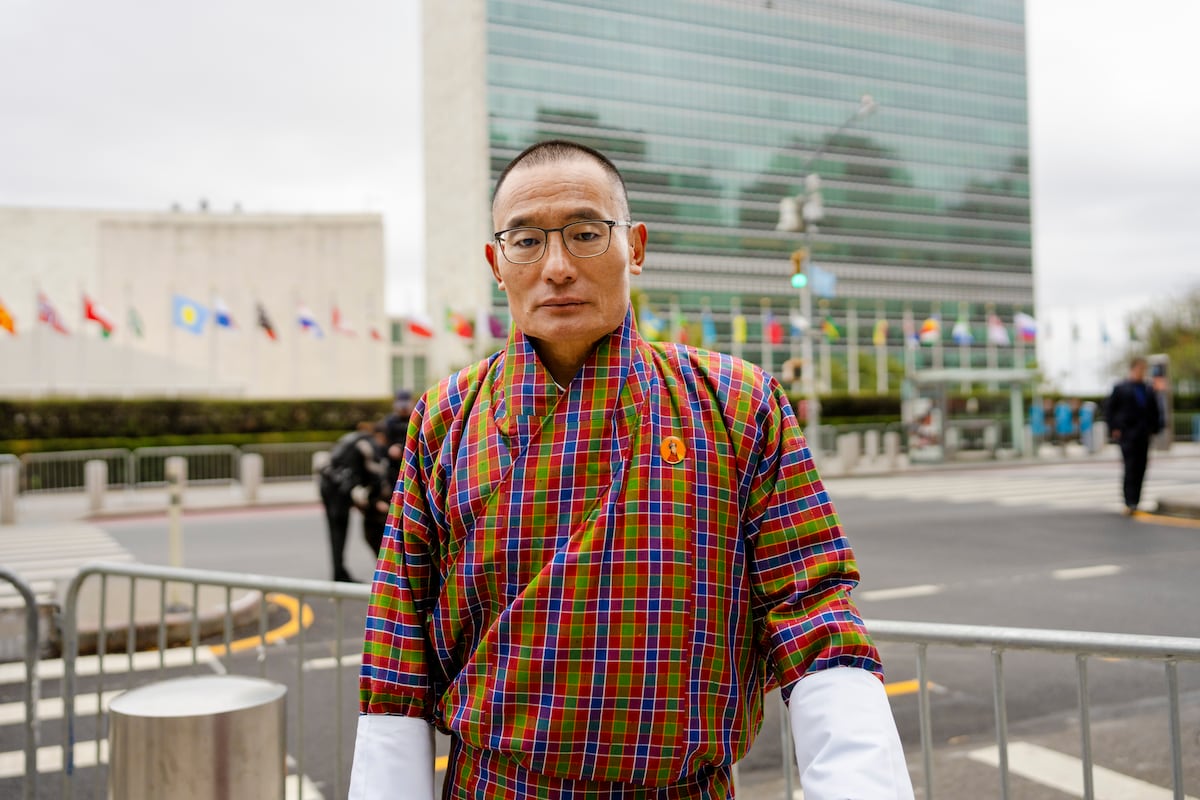Tshering Tobgay is the prime minister of Bhutan, a small Himalayan country well-understandn for its organic beauty and for having set uped an index to meaconfident the happiness of its citizens. Tobgay, 59, passes thraw security at the United Nations headquarters in New York in a colourful outfit. He has come to join in the UN General Assembly and has getn the opportunity to interfere in a argue on the need to employ parameters beyond the purifyly economic, contendnt of measuring the well-being of the people and the future of the environment.
The employ of the Gross National Happiness Index (GNH) does not uncomardent that Bhutan is an idyll. Tobgay acunderstandledges that pcleary still exists and that many lesser people emigrate. International human rights organisations are also calling for the country to reestablish its judicial system and promise freedom of conveyion. Tobgay disputes that the index serves to discover lowcomings. According to the prime minister, the results of recent years propose that “people in agricultural Bhutan are less satisfyed than those in urprohibit Bhutan. People who are less teachd are less satisfyed than people who are teachd. Women are less satisfyed than men.”
Question. In Bhutan, you run the Gross National Happiness Index. Why do you leank it is vital to go beyond GDP?
Answer. Gross National Happiness is a growment philosophy that puts happiness and well-being in the caccess of our growment agfinisha. GDP is vital. But there are other leangs that are equassociate vital. The idea is, the ask is, why GDP? We have to ask ourselves why we want economic growth. It has to be ultimately for the happiness and well-being of the people.
Q. How is it meaconfidentd?
A. Gross National Happiness accomprehendledges that GDP is vital, economic growth is vital, material better is vital. But economic growth, material better, must be equitable with social better, with cultural preservation, with environmental preserveability and with outstanding administerance. We have nine domains. There’s health, education, living standards. Then we have environment and administerance. And then employ of time, psychorational well-being, community vitality, and cultural vitality.
Of course we have contests, our economy is small, but it is bigly environmenhighy preserveable, we have free healthattfinish, free education”
Q. Why is it vital to meaconfident time employ?
A. To discover out whether it’s equitable, if you’re sleeping enough, how you deal with toil-life stability, etc. These nine domains are splitd into 33 indicators, and they are further splitd into 150-odd asks. And then we run these asks thraw the population on a sample. And this is how we calcuprocrastinateed the GNH index. The first GNH index was meaconfidentd in 2010.
Q. And what have you lgeted in these years about the troubles of the population?
A. From the sample, we’ve lgeted that even though living standards are increasing, there’s a contrastence between the people in urprohibit areas and agricultural areas in terms of living standards. The survey shows that people in agricultural Bhutan are less satisfyed than those in urprohibit Bhutan. People who are less teachd are less satisfyed than people who are teachd. Women are less satisfyed than men.
Q. Why?
A. Although women’s overall happiness is increasing and the gap is skinnying, overall women are less satisfyed than men. The index shows that women are toiling extfinisheder hours than men. And one reason women are toiling extfinisheder is becaemploy hoemploytoil and family toil is pondered toil according to this meaconfidentment.
Q. Experts highairy the better that Bhutan has made, but there is still a lot of pcleary and deficiencies.
A. Of course we have contests, our economy is small, but it is bigly environmenhighy preserveable, we have free healthattfinish, free education. Literacy rates are very high. Youth literacy rate is almost 97%. In terms of environment, we are a biorational boilingspot and we are a carbon pessimistic country. That’s why Bhutan is one of very restricted countries who have graduated from the UN’s least-growed country catebloody.
Q. Many lesser people pick to emigrate.
We cannot have too many tourists in our country becaemploy it will go aacquirest preserveability policies. The very leang that tourists come to visit could be ruined”
A. The problem is that jobs are not attrvivacious enough for our lesser people and that uncomardents we have to convey in labour from outside, for example, for produceion. All our lesser people have gone to college and all our lesser people can speak English. And so if need be, they are willing to go awide and toil, where they can get more money. And our economy is not able to contend with that.
Q. Bhutan has recently presentd a preserveability tax for tourists. Is it toiling or have visits deteriorated?
A. We cannot have too many tourists in our country becaemploy it will go aacquirest preserveability policies. The very leang that tourists come to visit could be ruined, whether it is nature or culture. Our policy for tourism is high appreciate, low volume. In includeition, our infraarrange is restricted. And becaemploy of all of that, we’ve set a aim of 300,000 tourists per year. As of now, it’s still only 170,000 tourists per year, so we can incrrelieve the number of visitors that we get in. The proceeds from the preserveability growment fee are eartaged for nature, health and education.
Q. Your country is Buddhist. How much religion is retained in the philosophy of the Gross National Happiness Index?
A. There’s no religion in GNH. I’m confident our appreciates, our spirituality, has swayd GNH, but it is not religious.
Sign up for our weekly recentsletter to get more English-language recents coverage from EL PAÍS USA Edition










